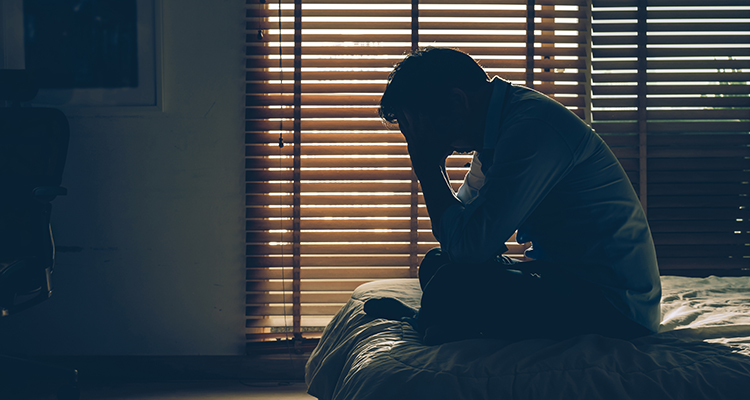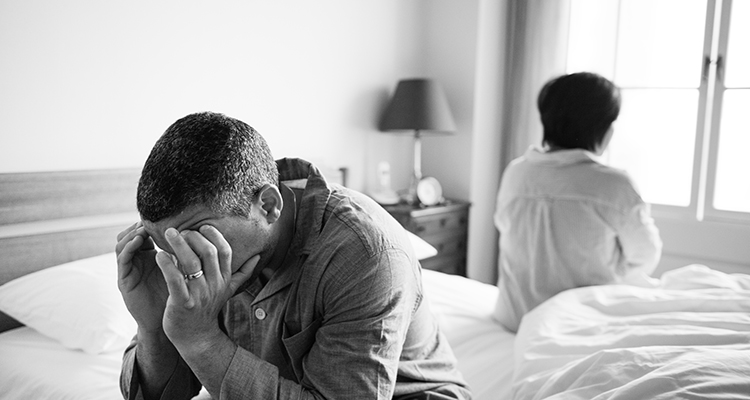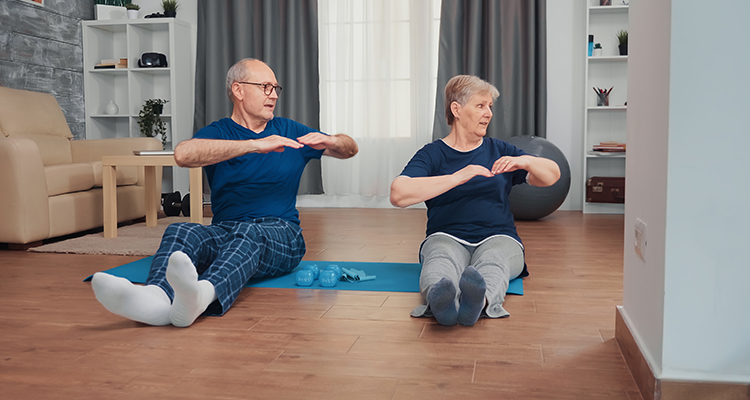Understanding the Connection Between Dementia and Sleep
Over 55 million people suffer from dementia, also described as the loss of cognitive function. Individuals with dementia struggle with remembering things, thinking, reasoning, and processing information. In severe cases, these cognitive impairments drastically impact daily life and can even result in death. Many people with dementia also struggle to control their emotions and experience drastic changes in their mood and personality.

The most well-known and common form of dementia is Alzheimer’s disease but this cognitive disability comes in many forms. Sadly, people with dementia experience poor quality of life and strained relationships with family, friends, and loved ones.
In this article, we’ll take a closer look at how dementia and cognitive decline impact sleep and how insomnia may be a precursor for dementia.
Content
What Causes Dementia?
Dementia is irreversible. Once brain function is lost, there’s no way to restore it. Dementia impacts a person’s ability to speak, remember, solve problems, and perform other basic cognitive processes. Most cases of dementia affect adults over the age of 65. In dementia patients, brain cells don’t function as well and begin to die more quickly than in those with healthy cognitive function.

While many older individuals experience some level of memory loss and confusion, in dementia, these symptoms are much more obvious and severe. Other early warning signs of the disease include:
- Memory loss
- Difficulty communicating (finding words)
- Difficulty reasoning and problem-solving
- Difficulty performing complex tasks
- Difficulty organizing and planning
- Difficulty with spatial and visual awareness
- Disorientation and confusion
- Restlessness
- Personality changes
- Wandering or getting lost
- Depression
- Paranoia
- Muscle impairment (difficulty walking)
- Difficulty sleeping
Many of these symptoms are first noticed by others, as some dementia patients are in denial of their condition or don’t recognize the warning signs.
Insomnia as a Sign of Dementia
While many things can cause insomnia, research suggests that sleep disturbances in older individuals may be a sign of early-onset dementia. Others believe that dementia causes insomnia, creating a complex relationship between cognitive function and sleep. Dementia patients experience significant structural changes and damage to the brain which can directly impact your sleep-wake cycle and ability to fall and stay asleep.

The SCN, the suprachiasmatic nucleus, which is located in the hypothalamus of the brain, is responsible for controlling your circadian rhythm. When dementia and other neurodegenerative diseases occur, certain parts of the brain slowly deteriorate – including cells in the hypothalamus. These brain cells become less responsive and “debris” starts to build up, disrupting the neurons’ ability to function properly. A condition known as atrophy occurs when individual brain cells die and cannot be restored.
When the SCN becomes compromised, so does a person’s ability to sleep consistently. Most people experience issues with their normal sleep-wake cycle. Circadian rhythm disorders are common among dementia patients. Advanced sleep phase syndrome is a sleep disorder that impacts older patients and involves becoming tired very early in the night followed by waking very early in the morning. If these changes are beyond one’s control, they may be a sign of changes in the brain’s structure due to dementia.
In addition to changes in your circadian rhythm and sleep patterns, dementia may also alter your sleep structure. Your body naturally progresses through 4 sleep stages starting with light sleep and ending in deep, restorative sleep stages known as slow-wave sleep and REM (rapid eye movement) sleep. These last 2 stages are critical for restoring your mind and body. Studies show that dementia patients spend less time in slow-wave and REM sleep and more time in the early stages of sleep, which aren’t as beneficial. Less restorative sleep can also make dementia symptoms worse and speed up its progression.
It’s important to note that not all sleep pattern changes in elderly individuals are a sign of dementia. Many healthy aging adults experience changes in sleep, most notably a shift in what time they go to sleep and wake up. Other changes include fragmented sleep, difficulty falling asleep, and sleeping fewer hours. While these minor changes are common, dementia patients often experience more disruptive and significant shifts in sleep patterns.
Common Sleep Disorders in Dementia Patients
Dementia patients are at higher risk of developing specific sleep disorders. Let’s take a closer look at what these disorders are and how they can impact your ability to achieve quality sleep.

Insomnia
Insomnia describes persistent difficulty falling and staying asleep and it plagues over 70 million adults. Between 20% and 25% of dementia patients report insomnia symptoms. A disruption in the sleep-wake cycle is usually to blame for insomnia. Long-term sleep deprivation causes changes in certain parts of your brain – many of which are associated with dementia and Alzheimer’s disease. In addition, research shows that your chances of getting Alzheimer’s disease significantly increase if you also suffer from primary insomnia before the age of 40.
Restless Leg Syndrome (RLS)
Another common sleep disorder that’s more prevalent in dementia patients is RLS. Restless leg syndrome causes discomfort in the legs and an uncontrollable need to move your legs to help relieve symptoms. Unfortunately, this discomfort gets worse at night, when your body is at rest, making it difficult to fall and stay asleep.
RLS is most common in patients with a form of dementia known as Lewy body dementia (LBD). This type of dementia is marked by abnormal deposits of protein in the brain. These deposits, also known as Lewy bodies, affect certain chemicals in the brain which trigger problems with behavior, mood, movement, and critical thinking.
Similar to RLS, periodic limb movement disorder (PLMD) causes the same type of uncontrollable movements as RLS except in the arms, though some patients report leg movements as well.
Obstructive Sleep Apnea (OSA)
Obstructive sleep apnea (OSA) occurs in patients who can’t breathe normally during sleep due to upper airway obstruction. These obstructions are caused by several factors including age, obesity, and alcohol use. Symptoms include snoring and periods of stopped breathing or gasping for air during sleep. OSA is a serious sleep disorder that can result in death if left untreated.
Those with OSA are also at higher risk of developing dementia. When you can’t breathe properly at night, your brain lacks sufficient oxygen, causing a condition known as hypoxia. Long-term sleep apnea can negatively impact brain function in several ways including:
- Difficulty making decisions and staying focused
- Slow motor movements
- Early-onset dementia
- Other serious neurological disorders
- Stroke
- Diabetes
As much as 40% of Alzheimer’s patients also suffer from OSA.
REM Behavior Disorder (RBD)
Most people are in a state of partial paralysis during REM sleep. Your body and muscles are completely relaxed and at rest. This isn’t the case in people with RBD. During their REM sleep cycle, their muscles move and twitch involuntarily, causing them to wake up repeatedly during the night. Individuals with neurological disorders such as Parkinson’s disease or LBD are at greater risk of developing RBD and experience frequent sleep disturbances.
Shorter and Longer Sleep
Many dementia patients experience either short sleep (less than 7 hours) or long sleep (more than 8 hours). Short sleep occurs when a person experiences a dip in beta-amyloid and tau levels in the brain. These proteins are directly linked to Alzheimer’s disease. In dementia patients who sleep longer than 8 hours, the reason is less clear. Some scientists argue that this increased need for sleep could be triggered by other health conditions like OSA or depression.
Depression
Speaking of depression, while this mental health disorder isn’t exactly a diagnosable sleep condition, many patients with dementia suffer from extreme mood swings that can interrupt sleep. As dementia progresses to more serious stages that include violent outbursts, mood swings, and significant personality changes, the risk of depression increases at an alarming rate.
Sundowning
Sundowning is used to describe a stage of dementia when patients experience increased emotional distress and agitation, especially in the late afternoon and evening. Common symptoms of this condition include anxiety, increased confusion, yelling, wandering, and other outbursts. When these behaviors continue into the night, it can contribute to insomnia and other sleep disturbances. It’s believed that changes in your circadian rhythm, increased depression, fatigue, and pain associated with dementia may also cause sundowning.
Vivid and upsetting dreams are also common during sundowning. Some patients even jump, grab, and shout angrily during sleep as part of REM sleep behavior disorder. Wandering is another common side effect of dementia and can cause dangerous sleepwalking and confusion.
How Dementia Patients Can Improve Sleep and Treat Insomnia
Whether you’re facing dementia and find it difficult to sleep or you’re concerned that lack of sleep is creating cognitive difficulty, there are ways to ease symptoms including insomnia treatment at home and other lifestyle changes.

Let’s take a closer look at ways for dementia patients to achieve deep, restorative sleep.
Create a Consistent Sleep Schedule
The fastest way to realign your circadian rhythm and keep your sleep on track is to establish a consistent sleep schedule and stick to it. Try setting predictable sleep and wake times. That means going to bed around the same time every night and waking at the same time each morning, even during weekends or holidays.
Perform soothing, calming behaviors before bed that help relax your mind and body. Things like meditating, taking a warm bath, or reading a book are all great ways to unwind and promote quality sleep. Ditch electronic devices or screens at least 90 minutes before bed. The blue light from these devices can prevent your brain from releasing the sleep hormone melatonin.
Socialize and Exercise
A schedule for sleep isn’t the only thing that can benefit dementia patients. You should also schedule time for exercise and social interaction, both of which are proven to improve your mood and sleep quality. One study showed that dementia patients that engaged in social activity outside the house for one to two hours per day reported sleeping better at night.
Physical activity and exercise have long been attributed to better quality sleep. Get up and get moving early in the day. Exercising in the morning can improve your mood and boost energy levels. Avoid exercising too close to bedtime where it may have adverse effects, causing you to feel more alert. Dementia patients who incorporate regular exercise into their daily routines also report a reduced need to nap and less daytime drowsiness.
Eliminate Unhealthy Behaviors
Leading a healthy life that promotes quality sleep and cognitive function includes reducing unhealthy behaviors. This includes smoking cigarettes and consuming too much alcohol or caffeine. All of these things act as stimulants, making it increasingly difficult to get a good night’s sleep.
Drinking alcohol increases your risk of developing OSA, another sleep disorder associated with dementia. Nicotine use is bad for your overall health but may also cause other serious conditions including cancer and heart disease. Caffeine is fine in moderation but consumed too late in the afternoon and it can significantly interrupt your sleep. Opt for decaffeinated coffee or tea and limit your intake of foods and drinks high in sugar and caffeine.
Try Light Exposure Therapy
Another effective way to realign and synchronize your circadian rhythm is through light exposure therapy. Your internal circadian rhythm (sleep-wake cycle) operates based on exposure to light and dark. This dates back long before we had electricity and access to artificial light. At that time, your body naturally fell into a sleep-wake cycle based on the rising and setting of the sun. Now, with so many distractions, it’s far too easy for your circadian rhythm to become misaligned.
The more natural light you’re exposed to during the day, the better you sleep at night. If you don’t have access to natural light by way of getting outside or letting natural light flow into your home, light therapy exposure can help. Light therapy lamps give off UV rays similar to those from the sun. By sitting in front of a light for 20 to 30 minutes in the morning, you’re letting your brain and body know that it’s time to be awake and alert. In the same turn, limit exposure to light too close to bedtime since darkness signals your brain that it’s time for sleep.
Treat Underlying Conditions and Chronic Pain
Dementia patients often suffer from additional health issues that complicate matters and may interrupt sleep even more. One such condition is chronic pain, a common cause of insomnia. It’s not uncommon for dementia patients who also experience pain since a majority of people who develop this condition are over the age of 65. Both mental and physical conditions including depression can also trigger insomnia in dementia patients. By identifying and treating these underlying ailments, you may find relief for your dementia and insomnia symptoms.
Design a Sleep Environment that Promotes Relaxation and Sleep
Your bedroom should be an oasis for sleep. That means creating a welcoming, dark, and quiet space for you to unwind, relax, and achieve quality sleep. By limiting distractions, you’re more likely to fall asleep faster and stay asleep without interruptions.
Start by reducing noise using a sound machine or fan. Next, eliminate stimulating light using room darkening shades or a sleep mask. Invest in a comfortable mattress and quality bedding. It’s also important to limit non-sleep activities in bed including eating, watching television, and working. Performing these tasks in bed confuses your mind into thinking it should be alert and awake rather than asleep. Avoid lying in bed awake for more than 15 minutes to solidify the connection between your bed and sleep. If you’re struggling to fall asleep, get up and perform a relaxing activity until you feel like you’re tired enough to return to bed.
Be Mindful of Your Medication Use
While there’s no treatment for dementia, some healthcare professionals recommend certain medications as a last-resort. Using sleep aids to treat insomnia caused by dementia can add to increased sedation, risk of injury, and confusion. Antidepressants are sometimes prescribed to dementia patients to help treat mood swings and personality changes but may worsen insomnia symptoms. Similarly, certain cholesterol medications used to improve behavioral symptoms and cognitive function in Alzhemier’s patients have the unpleasant side effect of insomnia. Dementia patients should speak to a doctor before taking any new medications.

Improving Cognitive Function and Sleep Go Hand-in-Hand
Getting quality sleep can be difficult when faced with declining cognitive function or a dementia diagnosis. Additionally, some research suggests that lack of adequate sleep may increase your risk of developing dementia and other neurological disorders. The best way to cognitive decline and improve dementia symptoms is to get a quality night’s sleep. For insomnia sufferers, this is easier said than done.

The experts at Somnus Therapy can help. Through a variety of therapy options and treatment programs, we help insomnia patients understand, accept, and treat their sleep disorders.
Click here to learn more.














